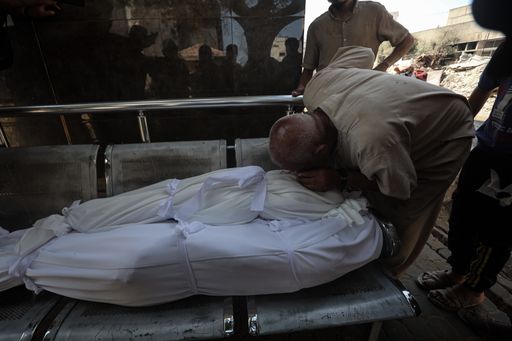As the global spotlight shifts to the rising military exchanges between Israel and Iran, Palestinians in Gaza continue to face new waves of bombardment, starvation, and death.
Millions of Palestinians in Gaza faced relentless Israeli attacks even as prospects of a ceasefire faded amid Tel Aviv’s opening of the Iran front that has seen both sides trade missile and drone strikes since Friday morning.
The developments ran contrary to Israeli Prime Minister Benjamin Netanyahu’s public acknowledgement of a potential opening for a ceasefire and hostage release deal—possibly tied to a US-proposed 60-day truce.
Netanyahu claimed readiness to proceed with negotiations, but his government simultaneously intensified strikes across Gaza and the occupied West Bank.
At least 42 Palestinians were killed in a single day on June 14, many of them while waiting for food near aid distribution sites.
In total, more than 100 people have reportedly been killed at food lines since late May, painting a dire picture of the ongoing humanitarian catastrophe.
Death while seeking aid across Gaza
The last four days saw dozens of Palestinians killed as they gathered near aid points in Gaza City, Rafah, Khan Younis, and Beit Lahia.
On June 14 alone, Israeli fire killed 27 aid-seekers, and Gaza’s civil defence agency later reported 41 dead—more than half while queuing for food.
“Forty-one people were martyred due to the ongoing Israeli bombardment of the Gaza Strip, 23 of whom were waiting for aid,” Mohammad al-Mughayyir, an official from the agency, told AFP.
The attacks targeted tents, mosques, and makeshift shelters where displaced civilians had sought refuge.

On June 15, five more people were gunned down near food lines in central and southern Gaza, including at US- and Israeli-backed Gaza Humanitarian Foundation sites.
Critics accuse the foundation of facilitating forced displacement while failing to provide access to aid. The UN and major aid groups have refused to cooperate with the foundation over concerns it was designed to cater to Israeli military objectives.
"GHF, I think it's fair to say, has been, from a principled humanitarian standpoint, a failure," Jens Laerke, spokesperson for the UN humanitarian agency OCHA, told a press briefing in Geneva.
"They are not doing what a humanitarian operation should do, which is providing aid to people where they are, in a safe and secure manner,” he added.
Meanwhile, Egyptian authorities blocked a Global March to Gaza organised by activists hoping to reach the Rafah border crossing.
Several were detained, expelled, or denied entry as Egypt cracked down on pro-Palestine demonstrations amid growing regional solidarity.
Al Aqsa Mosque closed, homes vandalised
A three-day internet blackout, blamed on Israeli strikes, deepened Gaza’s isolation until it was lifted on Saturday.
The Palestine Red Crescent said the outage severely impeded emergency responses, further endangering civilians.
Though service had been restored by June 14, the Palestinian Telecommunications Regulatory Authority confirmed on Monday that a renewed internet and landline outage had occurred across southern and central Gaza due to damage from Israeli attacks on communications infrastructure.
Parallel to its bombardment of Gaza, Israel escalated its repression in the occupied West Bank and East Jerusalem.
A full lockdown was imposed across the West Bank on June 13, coinciding with Israel’s air strikes on Iran.
In the occupied East Jerusalem, Israeli police forcibly evacuated worshippers from Al Aqsa Mosque after dawn prayers and sealed its gates, marking the first closure of the compound since the COVID-19 pandemic.
In Ramallah, Israeli forces stormed Jalazone refugee camp, arrested three former prisoners, and vandalised homes.
Civilian toll mounts
Between June 13 to 16, Israeli strikes killed scores of Palestinians, with medics reporting at least 25 deaths on Sunday alone.
Air strikes hit residential areas, tent camps, and aid lines with indiscriminate fire.
In Khan Younis and Nuseirat, bodies piled up at overwhelmed hospitals.
Al-Awda and Al-Aqsa Martyrs hospitals received dozens of victims, many of them children and the elderly.
On Monday, Israeli forces intensified attacks across Gaza, killing and injuring dozens of Palestinians, including children, in renewed assaults by land, air, and sea, Palestinian news agency WAFA reported.
Medical sources confirmed the killing of two Palestinian fishermen and the disappearance of a third after Israeli naval forces opened fire on their boat off the coast of Gaza City.
In southern Gaza, three Palestinians were killed and at least 20 others injured while waiting for humanitarian aid near the Al-Alam area west of Rafah, where Israeli forces have previously targeted civilians gathering for food assistance.
Now into its 619th day, Israel's genocide in Gaza has claimed over 55,300 deaths, with fears some 11,000 remain buried under debris, according to Palestinian authorities.















